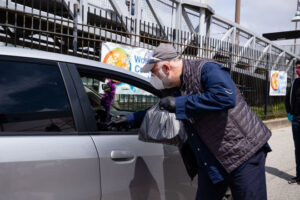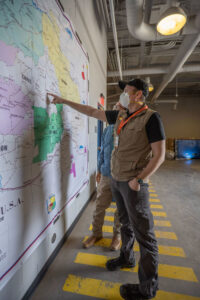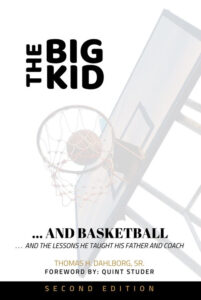Societal Contributions in the Time of COVID-19 and Other Disasters
In 2021 alone, we’ve experienced power outages and freezing cold in vast parts of Texas, a 6.2-magnitude earthquake in Indonesia, Hurricanes Eta and Iota hitting Central America, extensive flooding in Louisiana and other parts of the South, explosive wildfires in California, and the continued surges of COVID-19 resulting in survivors, first responders, front line health care workers, and other essential workers all facing exhaustion and often increased food insecurity.

What is a common thread among all of these? No, not the anxiety and fear that has gripped many of us, although that certainly is common. I’d like to introduce you to World Central Kitchen (WCK), whose team members and volunteers have been on the ground only hours or days after tragedy struck. Why, because it’s who they are. But first, a little background about how this story reflects WCK’s emphasis on societal contributions intersecting with the world of Baldrige.
Societal contributions are not only an Area to Address (1.2c) in the Baldrige Excellence Framework but also one of the eleven Core Values and Concepts. “These beliefs and behaviors are embedded in high-performing organizations.”
Two Components of Societal Contributions
In 1.2c, Societal Contributions is further divided into Societal Well-Being and Community Support. It’s in the multiple-level questions that we see the intent of these. “How do you contribute to the well-being of your environmental, social, and economic systems.” And, “How do your senior leaders, in concert with your workforce, contribute to improving these communities?” As is true for the rest of the Baldrige Excellence Framework, there are no prescribed methods that organizations must use to respond. Each organization as part of their leadership system, their culture, available resources, and strategic focus areas must carve out its own response related to Societal Contributions.
A Hidden Nugget in a Note
“Areas for organizational involvement in supporting your key communities might include areas that leverage your core competencies.” This has been demonstrated brilliantly by World Central Kitchen (WCK). https://wck.org/ Chef Jose Andres founded WCK in 2010 after a devastating earthquake hit Haiti. His mission was to help communities in crisis following a disaster of some kind by mobilizing trained cooks (food first responders, as they are called), establishing supply networks, and arranging the necessary logistics by feeding affected people at least one hot meal a day. And the hot meal is representative of the local cuisine, offering a comforting experience in addition to sustenance.

This is Chef Andres’ true story of feeding hundreds of thousands of Americans after Hurricane Maria. Since then, the food first responders have shown up following more hurricanes, massive flooding, and deadly wildfires. They also showed up at cities hit hard by COVID-19, most recently expanding their outreach to the Navajo Nation.

Supporting First Responders at the Kincaid Fire in California

What Are Your Organization’s Core Competencies and How Could They Be Leveraged in Support of Your Key Communities?
Many organizations think in terms of donations of dollars as their response to community support, and yes, sometimes that may be the best way to offer help. However, if you consider your core competencies, other opportunities may emerge. One of our Baldrige Award winning clients, Guidehouse (formerly PricewaterhouseCoopers – Public Sector Practice) opted to stop funding some of the arts in favor of standing up a service to help Veterans find jobs, applying their skills in program management to help small businesses, and their expertise in science, technology, engineering, and math to launch STEM projects in local schools.
Some of our not-for-profit clients support their key communities with in-kind donations of meeting space, employees willing to support causes and events for other not-for-profits, free health screening, and leaders providing education to local groups on current topics of interest.
In the world we live in, there are no shortages of opportunities to reach out to help others in need. What is your organization doing, and what will you and your organization do next?
Bullying as a Societal Issue?
 I believe so, and as adults and leaders, it’s important for us to stand up against bullies, no matter where we see them. But do we know what to do that will be effective?
I believe so, and as adults and leaders, it’s important for us to stand up against bullies, no matter where we see them. But do we know what to do that will be effective?
Check out my friend Tom Dahlborg’s second edition of his award-winning book.
The story of a child who overcame the impact of bullying through resilience, sports, and love and how he taught his dad courage and determination.
Now featuring:
A powerful foreword by Quint Studer, Founder Studer Community Institute and Owner of the Pensacola Blue Wahoos (Minor League baseball team)
Additional tangible tools, strategies, tactics to stop bullying and mitigate its impact (what to do and what not to do and why)
A keen focus on the non-X’s and O’s of Coaching (e.g., supporting children who are dealing with ACES)
Coaching and Leadership Principles
More of Tommy’s aka The Big Kid’s own voice
An incredible poem was written by an 11-year-old girl highlighting the impact of bullying and More
https://www.amazon.com/dp/
